The Russia-Ukraine conflict can intensify the already shaken economic conditions created by COVID-19 as inflationary pressures might have an effect on many countries. Investors in Central and Eastern Europe are cautious with their investments. As per an IMF report, the sanctions imposed against Russia will impact the global economy. It clearly seems to have already affected FDI and portfolio investment in many countries, including India. The Union Finance Minister of India had stated that the Russia-Ukraine conflict and surge in crude oil prices pose risk to the financial stability of the country.
Russia’s invasion of Ukraine has triggered wide-ranging sanctions against Russia by the US and the western world. Effects of the sanctions are already visible in Russia as well as in many other economies. The full extent of the catastrophic consequences is expected to be much more severe for the highly globalized, inter-connected, and inter-dependent world. On the humanitarian front, Ukraine has been suffering on account of the loss of lives and property, and mass. Nearly a quarter of the Ukraine population has migrated to many destinations with Poland taking most of the refugees. In sum, the invasion has shattered the peace in Europe and has thrown the continent’s entire security structure into jeopardy (Kalotay, 2022). The impact of the Russia-Ukraine conflict is likely to be catastrophic on the economy and calls for immediate solutions.
The economic consequences of the conflict are a lot more severe and wide-ranging than anticipated and go far beyond the rise in the energy and commodity prices in most economies that were yet to recover from the supply chain disruptions caused by the COVID-19 pandemic. If the conflict prolongs or escalates, it could result in devastating damage to the world economy spreading far beyond the parties to the conflict. The sanctions on Russia will considerably impact the global economy and financial markets.
According to the International Monetary Fund (IMF), the war in Ukraine has not only resulted in a tragic loss of life and human suffering but has also caused massive damage to Ukraine’s physical infrastructure. Moreover, the seaports and airports are either damaged or closed. Logistics has become a challenge due to severely damaged or destroyed roads and bridges. Obviously, the international trade of not only Ukraine but many other countries is seriously hampered.
Ukraine has already requested emergency financing of $1.4 billion under the IMF’s Rapid Financing Instrument (IMF, 2022). IMF estimates that Ukraine’s economy could shrink by 35 percent this year alone, if the conflict prolongs, leading to recession and a large cost of reconstruction. Large-scale destruction in Ukraine has severely damaged its productive capacity which may potentially contract output, collapse trade flows, diminish tax collections, and cause deteriorations in its fiscal and external positions due to the loss of physical capital stock and large-scale migration (Larry, 2022).
Also Read: Russia-Ukraine Crisis: A Big Boost for Iranian Economy?
Large-scale destruction in Ukraine has severely damaged its productive capacity, which may potentially contract output, collapse trade flows, diminish tax collections, and cause deteriorations in its fiscal and external positions due to the loss of physical capital stock and large-scale migration
Such massive devastations and wide-ranging disruptions would undoubtedly have serious implications on the global capital flows impacting the Foreign Direct Investment (FD) in Ukraine and elsewhere significantly. As per the 2020 data, Ukraine was the 10th-largest recipient of FDI in Central and Eastern Europe and 56th globally (Barklie, 2022).
Going by the historical evidence, Ukraine’s economy had suffered an economic shock in 2014 when Russia annexed Crimea, by 6.6 percent in 2014 and 10 percent in 2015. So has been the case with the FDI in the country. Ukraine’s economy grew 3 percent last year and was expected to grow further 3.6 percent this year (BBC News,2022). The US, UK, and Germany have been the key investors in Ukraine’s economy. The software, renewable energy, and logistics sectors were the main areas of investment. The data also reveals that foreign investment in Ukraine has gone to its western regions mainly, wherein the German automotive companies were the biggest investors (Brink, 2022).
The economic and financial sanctions against Russia target its finance, energy, military, and industrial sectors as well as individuals and sporting events (Partridge, 2022). The full impact of the crisis on FDI flow to Russia and many other economies may not be comprehended adequately unless the effect of these sanctions is taken into account.
Some of these sanctions may have a major impact on both the inflow and outflow of FDI. One of such sanctions is the stopping of business projects in and with the Russian Federation by other governments anywhere in the world. Suspension of the Nord Stream 2 gas pipeline by Germany, for example, would not only affect the Russian Federation but also the economies of the partner countries. Obviously, the FDI flows would be negatively impacted by such sanctions (Kalotay, 2022).
Also Read: Russia-Ukraine Crisis: The Impact on India
Beyond the oil and gas industry, some Western firms also started to leave the Russian Federation and stopped their sales to the Russian markets. These include Apple, Nike, Spotify, Stonemaier Games, Disney, Warner Bros., Sony, and Netflix to mention a few industry giants. Even Russian airlines have been barred from airspace over the EU, UK, and Canada (Kalotay, 2022).
The banking assets abroad which were held by the Russian financial institutions were frozen including various state-owned entities, such as the VTB Bank, Promsvyaz Bank, the State Development Corporation Vneshekonom Bank or VEB, the Otkritie Financial Corporation, the Russian Agricultural Bank, and Novikom Bank. This sanction would have a double negative effect on the FDI. As it would get further aggravated due to ban or bankruptcies of the affiliates of these banks abroad, making it further impossible to finance the transactions of Russian multinationals abroad. The sanctions have already impacted the access to finance by foreign investors located in the Russian Federation. (Kalotay, 2022)
The exclusion of Russian banks, which are mostly state-owned, from the SWIFT payment system also has a major implication for FDI, as it would make all business transactions involving the Russian and foreign clients of these banks costlier and burdensome. While Russia has launched a Financial Message Transfer System of the bank of Russia (SPFS), it can’t serve as an alternative to SWIFT as it purely addresses the needs of domestic payments. Exclusions from SWIFT would undoubtedly result in a major obstruction hurting both inward and outward FDI extensively (Kalotay, 2022).
The economic and financial sanctions against Russia target its finance, energy, military, and industrial sectors as well as individuals and sporting events. IMF has forewarned that the war and the sanctions will ‘severely impact’ the global economy.
Also Read: Economic Implications of Russia-Ukraine Crisis
The devastating effect of these sanctions is already evident in the Russian financial markets. Russian Ruble has depreciated by 40 percent and the central bank has doubled its interest rates from 9.5 percent to 20 percent to support the currency. The stock market was also closed after a sharp decline. The full impact of these sanctions on the Russian economy is likely to be more severe, despite Russia’s efforts to resilience that it has developed to counter external sanctions drawing lessons from the earlier sanctions that were imposed against it in 2014. But, the ambit and scope of these current financial sanctions are, however, much broader than the earlier ones, especially the freezing of foreign exchange reserves held abroad (Gian Milesi-Ferretti, 2022).
IMF has already forewarned that Russia’s war with Ukraine and the subsequent sanctions imposed upon it will have a “severe impact” on the global economy. Central Asian economies, heavily reliant on Russian remittances would be particularly hit hard. During the first three quarters of 2021, the Kyrgyz Republic had received 83 percent of its total remittance from Russia. Azerbaijan, Armenia, Tajikistan, and Uzbekistan too had received more than 50 percent of their remittances from Russia alone. As the Russian economy weakens, the migrant workers may suffer the consequences adversely impacting their capacity to make remittances (Strachan, 2022). Much would, however, depend on how protracted the conflicts become. It may have only a little impact on FDI flows in Central and Eastern Europe countries, if the crisis ends soon. The consequences would much more severe if the war and sanctions prolong and escalate (Ratha & Kim, 2022).
Sanctions would, in fact, bite even those who are imposing them against Russia, at least tangentially. Even though the US has limited links to Ukraine and Russia, it is already experiencing a rise in inflation, which has already reached a four-decade high. Prices may continue to rise as the Federal Reserve raises interest rates (Kammer, 2022)
For the sixth month in a row, foreign portfolio investors (FPIs) were net sellers in February, selling shares worth $4.9 billion. It was also the most shares sold by FPIs since the epidemic began in March 2020, when they sold $8.3 billion worth of stock (Purohit, 2022). Domestic Institutional Investors (DIIs), though were net buyers of $1.4 billion in February 2022, absorbing selling pressure from FPIs to some extent. Since October 2021, foreign investors have increased their selling apprehending a hawkish tilt by the US Federal Reserve in response to rising inflation in the US. The selling accelerated since the war began. The Foreign Portfolio Investors (FPIs) have pulled about $20 billion out of domestic stocks since October, with net selling totalling approximately $9 billion in the last month (Modak, 2022).
Even though the US has limited links to Ukraine and Russia, it is already experiencing a rise in inflation, which has already reached a four-decade high. Since October 2021, foreign investors have increased their selling apprehending a hawkish tilt by the US Federal Reserve in response to rising inflation in the US.
Through its non-alignment strategy, India has, so far, skillfully balanced its relations with Russia and ‘the West’ for a long period (Shehadi, 2022). The reasons are obvious. Russia is India’s largest arms supplier (Mohan, 2022). India and Russia have maintained excellent trade relations since the 1960s and have dealt in everything from helicopters, transport aircrafts, tanks, and submarines to warships.
Foreign Institutional Investors (FIIs), Foreign Direct Investment (FDI) community, and the governments of many countries are, obviously, rethinking their approach towards backing the defence industry. Many investors are considering divesting from arms companies or excluding controversial weapons from their portfolios. Some have already removed the ‘highly destructive weapons’ category from their portfolios, while others have completely divested the defence or arms industries (Karadima, 2022). As institutional investors change their outlook, the FDI projects in the weapons and ammunition sector are announced in Australia, Belgium, Brazil, India, Poland, Turkey, the UAE, and the US which accounts for 23.5% of defence FDI projects globally. Notably, most Greenfield FDI projects in the defence sector come from the US, the UK, France, Israel, India, and Italy (Karadima, 2022).
According to a recent IMF report, the global economic repercussions from the Ukraine crisis are predicted to hurt India’s economy, while the conflict’s immediate impact on China is expected to be minor (The Economic Times, 2022). Prices in India have already begun to rise as the Russia-Ukraine crisis intensified, which posed a challenge for policymakers. Russia is a major player in global commodities markets, and the impact of its instability on the Indian economy cannot be overlooked.
In the post Budget interaction, the Union Finance Minister of India had stated that the Russia-Ukraine conflict and surge in crude oil prices pose risk to the financial stability of the country and that the government was closely monitoring the situation. Meanwhile, the Union Cabinet is aiming to approve the proposal of FDI in the Life Insurance Corporation (LIC) of India as an effort to cause foreign funds to participate in the upcoming Initial Public Offering (IPO) (ET Now, 2022). The approval has since been kept on hold due to the prevalent market conditions (Rebello & Tiwari, 2022)
Also Read: Bracing for the Changing Geopolitics: Ukraine Crisis and Energy Security in India
Prices in India have already begun to rise as the Russia-Ukraine crisis intensifies. Russia is a major player in global commodities markets, and the impact of its instability on the Indian economy cannot be overlooked.
Driven by the changes in the investor’s sentiments due to uncertainty caused by the Russia-Ukraine conflict, the FPIs have pulled up to Rs 17,537 crore from the Indian markets. In March, the investors took out Rs 14,721 crore from equities, Rs 2,808 crore from debt, and Rs 9 crore from mixed instruments, as per the depository data. It is quite expected, given the recent situation, that the FPI flows might remain volatile in the coming months (Kulkarni, 2022).
The Russia-Ukraine conflict can intensify the already shaken economic conditions created by COVID-19 as inflationary pressures might have an effect on many countries. Investors in Central and Eastern Europe are cautious with their investments as they look for political stability as a significant factor in selecting the site of investment (IMF, 2022). As per an IMF report, the sanctions imposed against Russia will impact the global economy. It clearly seems to have already affected FDI and portfolio investment in many countries, including India.
The quickest and the surest way out of the crisis and its fallouts is for everyone to realize that no one would be able to escape the catastrophic consequences if the conflict prolongs and escalates. They must sit across the negotiating table to find a meaningful and lasting resolution of the conflict, and sooner the better.
REFERENCES
- Barklie, G. (2022). What foreign investment/FDI does Ukraine attract? – Investment Monitor. Retrieved March 20, 2022, from https://www.investmentmonitor.ai/analysis/ukraine-fdi-snapshot-foreign-investment
- Brink. (2022). Russia’s Invasion of Ukraine Impacts Foreign Investment – BRINK – Conversations and Insights on Global Business. Retrieved March 20, 2022, from Quick Takes website: https://www.brinknews.com/quick-take/russias-invasion-of-ukraine-impacts-foreign-investment/
- Gian Milesi-Ferretti. (2022). Russia’s external position: Does financial autarky protect against sanctions? Retrieved March 19, 2022, from https://www.brookings.edu/blog/up-front/2022/03/03/russias-external-position-does-financial-autarky-protect-against-sanctions/
- IMF. (2022). IMF Staff Statement on the Economic Impact of War in Ukraine. Retrieved from https://www.imf.org/en/News/Articles/2022/03/05/pr2261-imf-staff-statement-on-the-economic-impact-of-war-in-ukraine
- Kalotay, K. (2022). The war in Ukraine deals a blow to Russia’s foreign direct investment links. (March). Retrieved from https://www.researchgate.net/publication/359018530_The_war_in_Ukraine_deals_a_blow_to_Russia’s_foreign_direct_investment_links
- Kammer, A., Jihad, A., Aemro, A., IIan, G., & Changyong, R. (2022). How War in Ukraine Is Reverberating Across World’s Regions – IMF Blog. Retrieved March 20, 2022, from https://blogs.imf.org/2022/03/15/how-war-in-ukraine-is-reverberating-across-worlds-regions/
- Karadima, S. (2022). What impact will the Russia-Ukraine conflict have on investment in the defence industry? Retrieved from https://www.investmentmonitor.ai/special-focus/ukraine-crisis/russia-ukraine-conflict-defence-industry-fdi-esg
- Kulkarni, R. (2022). Russia-Ukraine War: Foreign Investors Pull Out Rs 17,000 Crore From Indian Market (Find Out Why?) | Trak.in – Indian Business of Tech, Mobile & Startups. Retrieved March 20, 2022, from https://trak.in/tags/business/2022/03/07/russia-ukraine-war-foreign-investors-pull-out-rs-17000-crore-from-indian-market-find-out-why/amp/
- Larry, E. (2022). Ukraine economy could shrink by up to 35% in 2022, says IMF | International Monetary Fund (IMF) | The Guardian. Retrieved March 20, 2022, from https://www.theguardian.com/business/2022/mar/14/ukraine-economy-shrink-2022-imf-russia-war
- Modak, S. (2022). FPI outflows exceed 2008 global financial crisis as Fed policy move nears | Business Standard News. Retrieved March 20, 2022, from https://www.business-standard.com/article/economy-policy/fpi-outflows-exceed-2008-global-financial-crisis-as-fed-policy-move-nears-122031400641_1.html
- Mohan, D. (2022). Eight charts to help understand the impact of sanctions on the Russian economy – and India. Retrieved from https://scroll.in/article/1018846/8-charts-to-help-understand-the-impact-of-sanctions-on-the-russian-economy-and-india
- News, B. (2022). IMF: Ukraine economy could shrink as much as 35% – BBC News. Retrieved from https://www.bbc.com/news/business-60743592
- Now, & T, digital E. (2022). Govt keeping tabs on Russia-Ukraine conflict, no rethink on proposed LIC IPO. ET Now Digital. Retrieved from https://www.timesnownews.com/business-economy/industry/govt-keeping-tabs-on-russia-ukraine-conflict-no-rethink-on-proposed-lic-ipo-article-89834776
- Partridge, J. (2022). Frozen out: how the UK’s sanctions against Russia will work | Business | The Guardian. Retrieved March 20, 2022, from https://www.theguardian.com/business/2022/feb/26/frozen-out-how-the-uks-sanctions-against-russia-will-work
- Purohit, R. (2022). Foreign portfolio investors sell $4.9-billion shares in February, highest since March 2020 | The Financial Express. Retrieved March 20, 2022, from https://www.financialexpress.com/market/foreign-portfolio-investors-sell-4-9-billion-shares-in-february-highest-since-march-2020/2449161/
- Ratha, D., & Kim, J. E. (2022). Russia-Ukraine Conflict: Implications for Remittance flows to Ukraine and Central Asia. Retrieved March 20, 2022, from https://blogs.worldbank.org/peoplemove/russia-ukraine-conflict-implications-remittance-flows-ukraine-and-central-asia
- Rebello, J., & Tiwari, D. (2022). LIC IPO: Investment bankers advice Centre against a hurried launch – The Economic Times. Retrieved from https://economictimes.indiatimes.com/industry/banking/finance/lic-ipo-investment-bankers-advice-centre-against-a-hurried-launch/articleshow/90112111.cms
- Shehadi, S. (2022). What is behind the Indian-Russian alliance? Investment Monitor. Retrieved March 20, 2022, from https://www.investmentmonitor.ai/special-focus/ukraine-crisis/indian-russian-alliance-ukraine-china-steel
- Strachan, R. (2022). Will the Ukraine invasion impact the FDI attractiveness of CEE countries? Retrieved from https://www.investmentmonitor.ai/special-focus/ukraine-crisis/ukraine-invasion-cee-fdi-investment-russia
- The Economic Times. (2022). Global economic fallout of war in Ukraine is expected to negatively impact Indian economy: IMF. Retrieved from https://economictimes.indiatimes.com/news/economy/indicators/global-economic-fallout-of-war-in-ukraine-is-expected-to-negatively-impact-indian-economy-imf/articleshow/90298283.cms
Disclaimer: The views expressed in this article are of the authors solely. TheRise.co.in neither endorses nor is responsible for them.









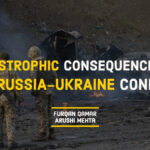

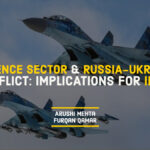
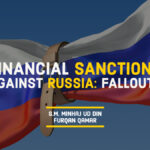

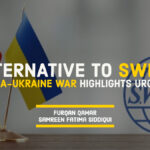
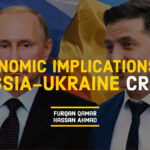


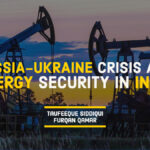


















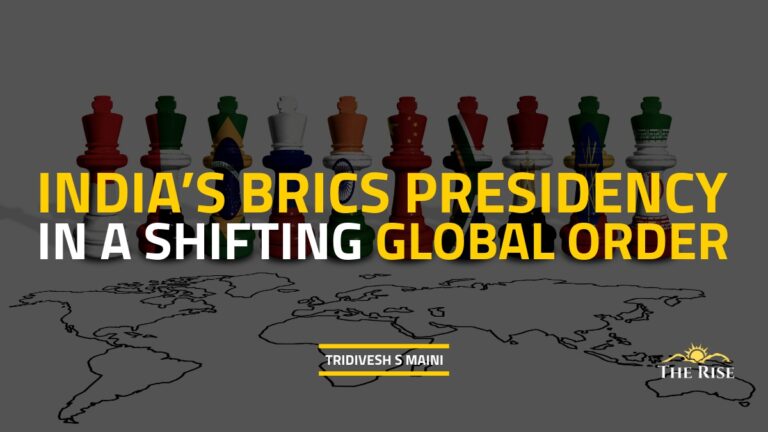



Pingback: Russia-Ukraine War: Alternative to SWIFT - TheRise.co.in
Pingback: Fallouts of Financial Sanctions Against Russia - TheRise.co.in
Pingback: Russia - Ukraine Conflict and Defence Sector: Implications for India
Pingback: Catastrophic Consequences of the Conflict - TheRise.co.in
Pingback: The Better Storyteller Wins War: Taboo in the Arms of Propaganda